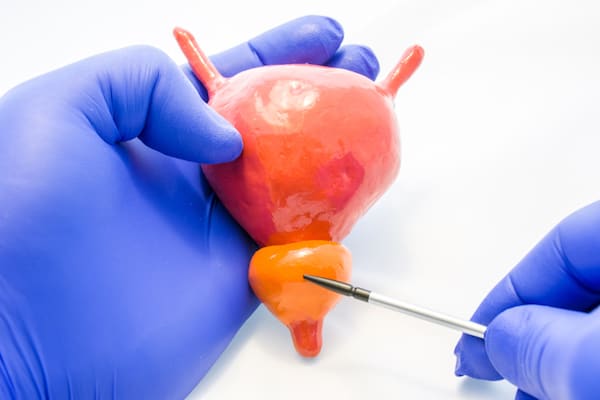
Prostate enlargement is one of the most common conditions shrouded by misinformation, most especially when it comes to identifying the main cause. Benign prostatic hyperplasia (BPH) is considered a noncancerous prostate gland enlargement that usually occurs as men age.
In this post, you’ll be aware of the cause of prostate enlargement and the contributory factors leading to such a medical condition.
Things To Know About Benign Prostate Hyperplasia
Old Age
In the United States, BPH affects about 40 million men ages 50 to 70 years old. While older men are usually the ones with a higher incidence of prostate enlargement, BPH can develop at any age. Prostate gland enlargement starts at the puberty stage and the growth continues until adulthood.
The age range (50 to 70 years old) is merely the point where men are at a higher risk of developing problems in the prostate gland. It’s because the prostate gland typically increases as a man advances with age. However, age is just a risk factor and not a demarcation line.

Sexual Activities
The frequency of sexual activity or being sexually active has nothing to do with the occurrence of prostate gland enlargement. No evidence suggests that an enlarged prostate is aggravated or caused by sexual habits.
As contrary to popular belief, an enlarged prostate is not connected with erectile dysfunction, which affects a man’s sexual performance and activities. That’s why it’s important to consult a doctor to clarify misconceptions and get proper treatment for both conditions.
Male Sex Hormones
The male sex hormones, dihydrotestosterone (DHT) and testosterone, may contribute to prostate enlargement. These hormones promote the growth of cells in the prostate gland.
During early puberty, the prostate gland starts to grow and continues to do so at 25 years old. This growth doesn’t stop, and the prostate gland is pressed against the urethra.
Treating BPH
Men can ease the symptoms of BPH by avoiding large amounts of liquids, caffeinated drinks (e.g., coffee, soda, and tea), and decongestant medications. Also, dietary supplements, like Prostagenix, can help.
Surgical procedures for BPH usually include removing or destroying the inner part of the prostate gland but won’t lower the chances of getting prostate cancer. Always ask your doctor about alternative options when it comes to various surgical procedures. It’s better to aim a less invasive procedure so you can go back to your normal activities sooner.
Medical Conditions That May Contribute to Prostate Gland Enlargement
The exact cause of BPH is unknown. However, aging and male sex hormones play a crucial factor in the development of the disease. Men with a family history of any prostate problems or testicular abnormalities have a higher risk of developing BPH. On the other hand, men who have had their testicles removed at a younger age don’t generally develop an enlarged prostate.
Here are some examples of testicular and prostate gland conditions and abnormalities that may pose a greater risk for developing BPH:
- Spermatocele: Known as an epididymal mass or spermatic cyst. This condition is typically painless and noncancerous or benign, wherein the scrotum is filled with fluid, usually above the testicle.
- Epididymitis: Refers to the inflammation of the comma-shaped structure located in the testicular area, which transports and stores sperm. It’s usually caused by a bacterial infection, such as chlamydia.
- Orchitis: Testicles become inflamed due to a viral infection, like mumps, or bacterial infection.
- Hydrocele: This occurs when there’s excess fluid between the sac layers surrounding each testicle.
- Hematocele: This occurs where there’s blood between the sac layers surrounding each testicle, caused by traumatic injuries, like direct blow caused by kicking the testicles.
- Varicocele: The veins carrying oxygen-depleted blood enlarge within the scrotum. This condition might cause infertility.
- Inguinal Hernia: A part of the small intestine is pushed through a weak spot or an opening in the tissue that separates the groin and the abdomen.
- Undescended Testis: During fetal development, an undescended testis doesn’t leave the abdomen and enters the scrotum. This medical condition can be corrected through surgery as early as childhood.
Conclusion
BPH happens to a lot of men; even your family and friends might also have this medical condition without their knowledge. Many people only notice they have BPH because the signs and symptoms become apparent.
The real cause of prostate gland enlargement is unknown. But there are many contributing factors that may lead to this condition, such as old age and previous history of prostate or testicular problems.
Throughout the year, our writers feature fresh, in-depth, and relevant information for our audience of 40,000+ healthcare leaders and professionals. As a healthcare business publication, we cover and cherish our relationship with the entire health care industry including administrators, nurses, physicians, physical therapists, pharmacists, and more. We cover a broad spectrum from hospitals to medical offices to outpatient services to eye surgery centers to university settings. We focus on rehabilitation, nursing homes, home care, hospice as well as men’s health, women’s heath, and pediatrics.







